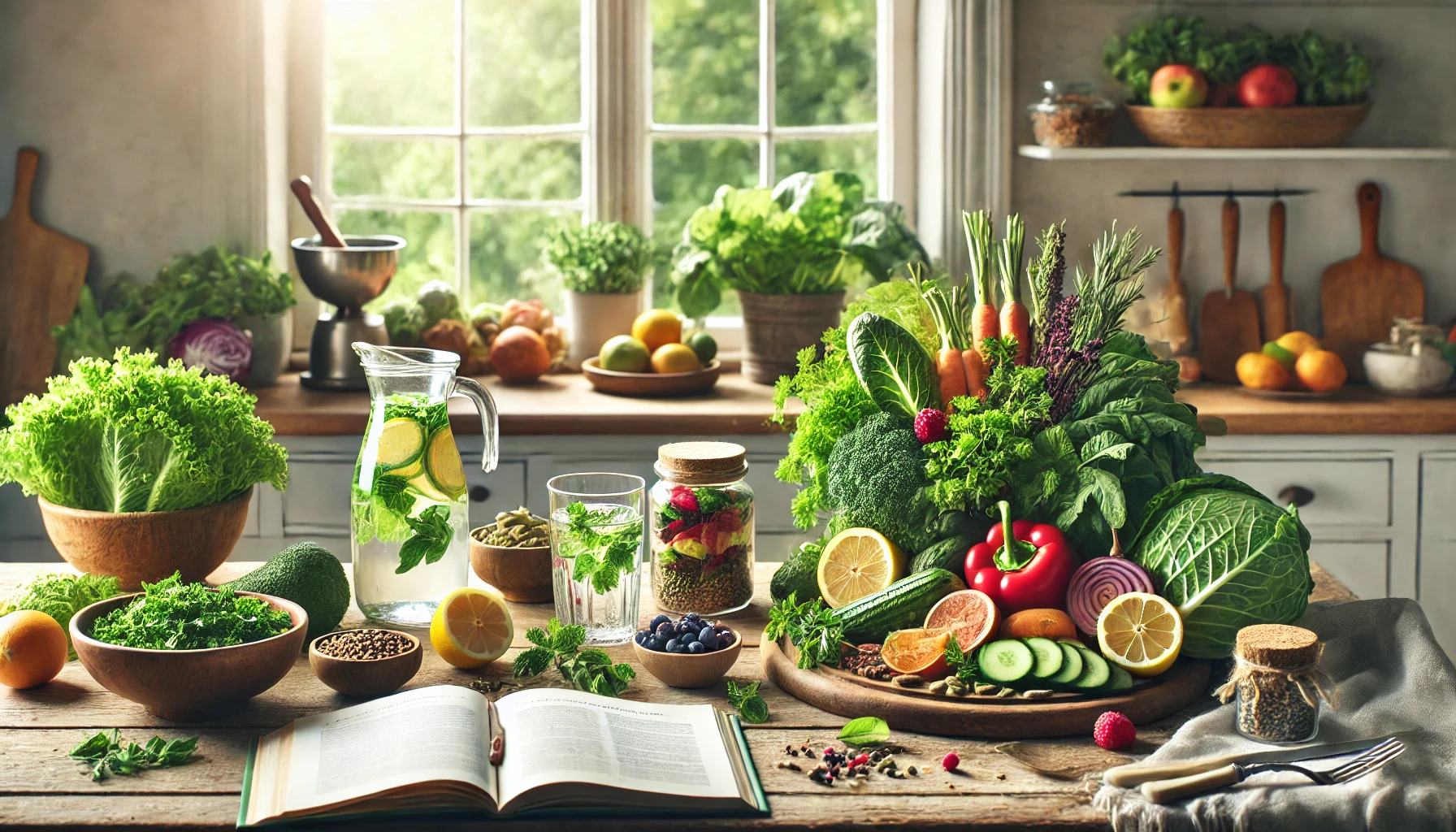Imagine waking up each morning feeling light and energized, your digestion smooth, your skin clear, and your mind sharp. For many of us, that’s not quite the reality. In today’s world, gut discomfort has almost become the norm. Bloating, sluggishness, and even skin issues seem to appear out of nowhere.
This was exactly the case for Priya, a busy professional. After years of quick meals, high stress, and poor sleep, Priya began to notice her energy levels plummeting and her digestion slowing down. For her, every day felt like an uphill battle with her own body.
Frustrated and eager for change, Priya stumbled upon the concept of a gut detox. She learned how accumulated toxins from processed foods, environmental exposure, and stress can disrupt digestion, mood, and even immune health. After deciding to try a gentle, natural gut detox, she started to see positive changes within weeks. Her energy rebounded, her digestion improved, and she felt a renewed sense of vitality.
Just like Priya, many people find that gut detoxification can be a powerful step toward overall wellness. Gut health affects more than just digestion—it’s a cornerstone of energy, immune strength, and mental clarity.
In this guide, we’ll explore why a healthy gut matters, how to naturally detox your gut, and tips for maintaining long-term gut health.
Why Gut Detoxification is Important
The gut is often called the “second brain” due to its integral role in numerous bodily functions. It houses trillions of microorganisms, collectively known as the microbiome. The microbiome aids in breaking down food, absorbing nutrients, and producing vital compounds for overall health.
Additionally, with around 70% of the immune system residing within it, a healthy gut supports immune function. The gut also impacts mental well-being, as it communicates with the brain through the gut-brain axis, thereby influencing mood, stress levels, and cognitive function.
Over time, an accumulation of toxins in the gut can disrupt its balance, causing symptoms that suggest it may be time for cleansing.
Common signs include:
- Bloating and gas
- Sluggish digestion or constipation
- Skin issues like acne or rashes
- Fatigue or low energy levels
- Brain fog
If you’re experiencing these symptoms, detoxing your gut may help improve digestion and restore energy.
How to Detox Your Gut: Key Methods and Tips
A natural gut detox doesn’t require harsh treatments; instead, it focuses on simple lifestyle changes. Some of the key changes required are as follows:
- Elimination Diet: An elimination diet helps you identify foods that may be irritating your gut or causing inflammation. Begin by removing common triggers like gluten, dairy, sugars, soy, and processed foods for a few weeks. Slowly reintroduce them, noting how your body responds. This process allows your gut to heal and minimizes unnecessary stress on your digestive system.
- Increase water intake: Water aids in flushing toxins from the body and keeping digestion regular. For better detox, it is advisable to add lemon juice to lukewarm water and drink in the morning. It acts as a natural antimicrobial.
- Consume fibre-rich foods: Fibre helps move waste through the intestines, supporting gut health. Fruits, vegetables, and whole grains are great sources.
- Limit processed foods: Reducing processed foods helps minimize additives, preservatives, and sugars that disrupt gut bacteria and digestion.
- Probiotics and Prebiotics: Probiotics are beneficial bacteria that support the gut’s microbiome, while prebiotics serve as food for these bacteria. Together, they help maintain a healthy microbial balance. Yogurt, kefir, sauerkraut, and kimchi are probiotic-rich foods. Indian alternatives like curd, buttermilk, kanji (fermented cabbage), Idli/Dosa batter and Gundruk are equally good. Meanwhile, foods like garlic, onions, salads, traditional grains, and provide prebiotics. You could also choose from a wide variety of high-quality supplementary probiotics and digestive enzymes, available with Autoimmunity Care.
Apart from the above, there are also some natural foods and ingredients that possess cleansing properties and help in gut detoxification:
- Ginger: Known for its anti-inflammatory properties, ginger can soothe the digestive tract and stimulate digestion.
- Turmeric: A powerful antioxidant and anti-inflammatory, turmeric aids in reducing inflammation in the gut.
- Apple cider vinegar: With acetic acid and beneficial bacteria, apple cider vinegar supports digestion and maintains a balanced pH in the stomach.
- Coconut Oil: Coconut oil has antimicrobial and antifungal properties. Two spoons of it taken early in the morning on an empty stomach boosts good bacterial.
It is also essential to support the liver and kidneys as these organs are responsible for filtering toxins from the blood, and hence crucial for efficient gut detoxification. So, we should consume foods such as leafy greens, beets, and citrus fruits, which benefit liver health. We must also stay hydrated to support kidney function. Together, these changes will enhance the detox process.
The Gut Cleansing Diet: Foods to Include and Avoid
A gut cleansing diet emphasizes whole, nutrient-dense foods that support detoxification and digestion. The following are some example of foods that should be included in your diet:
- Fibre-rich foods: Leafy greens, apples, chia seeds, cruciferous vegetables and whole grains promote healthy digestion.
- Antioxidant-rich foods: Blueberries, bell peppers, and green tea help combat oxidative stress in the gut.
- Healthy fats: Avocados, olive oil, and nuts support gut cell integrity and reduce inflammation.
Apart from the above, one must also be wary of what foods can hamper the process of detoxification, and hence should be avoided. These foods are as follows:
- Refined sugars: These can feed harmful bacteria in the gut and contribute to imbalances.
- Inflammatory foods: dairy, white rice, polished grains, simple carbs, caffeine, extra sweet fruits.
- Processed foods: Additives and preservatives can interfere with healthy digestion.
- Artificial additives: Dyes, artificial sweeteners, and flavour enhancers can disrupt gut health.
For your better understanding, the following is a sample gut cleansing diet plan for a day:
- Early morning: Begin your day with a glass of detox juice containing white pumpkin, cucumber, and any one green (dill, celery, coriander), along with a portion of sourness.
- Breakfast: Smoothie with spinach, chia seeds, blueberries, and almond milk.
- Lunch: Quinoa salad with mixed greens, cucumber, bell peppers, and a dressing of olive oil and apple cider vinegar.
- Dinner: Grilled salmon with steamed asparagus and a side of sweet potato.
- Snacks: Probiotic-rich yogurt or a handful of nuts.
This meal plan provides fibre, antioxidants, and healthy fats, all of which promote gut health.
Natural Methods to Support Gut Detoxification
Staying hydrated is one of the simplest and most effective ways to detox the intestine. Water supports waste elimination and keeps stools soft, thereby aiding in regular bowel movements. Aim for at least eight glasses of water a day.
Certain herbal teas can also aid in soothing and cleansing the gut. Some of them are as follows:
- Peppermint tea: Helps reduce bloating and gas.
- Fennel tea: Supports digestion and reduces inflammation.
- Dandelion tea: Acts as a mild diuretic, helping the liver and kidneys in their detox functions.
Besides dietary changes, certain lifestyle habits should also be incorporated in order to enhance detoxification. Some of the essential lifestyle changes for gut detoxifications are as follows:
- Stress reduction: Chronic stress affects gut health. Techniques like meditation, yoga, and deep breathing can help.
- Regular exercise: Physical activity supports healthy digestion and helps the body eliminate waste.
- Quality sleep: Good sleep is essential for the body’s natural detox processes, including those in the gut.
- Sun exposure: Adequate sun exposure helps boost vitamin D levels, which play a critical role in maintaining a healthy gut microbiome. Vitamin D deficiency has been linked to imbalances in gut bacteria. Therefore, spending 15–20 minutes in sunlight daily can be beneficial.
- Fasting and Intermittent Fasting: Giving your digestive system periodic breaks through fasting or intermittent fasting (such as the 16:8 method) allows the gut to repair and cleanse itself. Fasting triggers processes like autophagy, which clears out damaged cells and promotes gut health. Make sure to consult with a healthcare professional to determine a fasting schedule that’s safe and effective for you.
Incorporating these practices into your daily routine not only aids in gut detoxification but also supports long-term gut health and overall wellness.
How to Maintain a Healthy Gut after Detox
After detoxing, you can maintain a healthy gut by incorporating a balanced diet rich in fibre, healthy fats, clean proteins and probiotic-rich foods. Adding a wide variety of vegetables, fruits, and whole grains will continue to nourish your gut microbiome.
Gut detoxification can be an occasional practice, while routine gut maintenance involves ongoing healthy habits. Think of detoxing as a reset, and maintenance as the consistent lifestyle choices that keep your gut healthy daily.
While detoxes can be beneficial, it’s essential to consult with a healthcare professional before starting a gut detox plan, especially if you have digestive or autoimmune conditions. A professional can provide tailored advice and help avoid any adverse effects.
Detoxifying and cleansing your gut naturally can lead to numerous benefits, including better digestion, increased energy, and improved immune function. With simple changes like following a gut cleansing diet, staying hydrated, and using natural ingredients, you can support your gut health in a sustainable way. For long-term maintenance, we recommend our high-quality, gut-friendly probiotics and digestive enzymes such as AIC Gut Cleanse Care and AIC Leaky Gut Care.
By committing to these practices, you’ll be well on your way to a healthier, happier gut, improved overall wellness and quality of life.





2 Comments